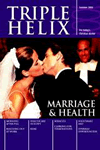This multi-author volume has three sections examining genetic engineering and society, the family and the individual. Each chapter can be read in isolation. Some general comments:
- The title is misleading – 'genetic engineering' implies the manipulation of genetic material but instead of considering all aspects of this (eg. the development of GM crops), this book deals entirely with human and medical genetics, specifically the potential impact of the human genome project.
- The science is a little dated (book is copyright 1999) but the principles still apply.
- Considerable space is given to reproductive issues and is therefore as relevant to the Christian obstetrician, midwife and reproductive medicine specialist as to the geneticist.
- The book is geared towards an American audience with an entire US authorship. Health insurance features prominently in the discussions of confidentiality and discrimination and even prenatal diagnosis. Patenting is examined from theological, social and US legal perspectives. A history of the US eugenics movement is provided.
Are there issues and principles on which the authors seem agreed?
- There are real dangers philosophically and practically if genetic causes of disease and behaviour are over-emphasised.
- There was a consensus against termination of pregnancy for fetal abnormality, agreement regarding life as beginning at conception and opposition to procedures that result in the destruction of early embryos.
- In general, the human genome project does not raise new ethical issues but amplifies existing ones. The potential abuse of genetic knowledge is seen in the context of the prevailing postmodernist philosophy. The book provides no new insights to these problems but it is helpful to have the arguments (scientific, biblical and ethical) laid out clearly.
For me, there were some surprises in the book. One author would not rule out future germ-line therapy or genetic enhancement and also suggested that genetic counsellors should reject non-directive policies (admittedly her work in cancer genetics allows greater scope for being directive). Another author agreed that some types of genetic enhancement are not so serious as to warrant prohibition. As for cloning, more than one author had an open mind – one chapter ends with the statement that 'as long as there are no embryos left over to be thrown away and none destroyed in the process there is no reason why cloned embryos cannot be used to enhance infertility treatments'.
Whilst personally I have quite a few reservations about this book, it remains a stimulating read and could be used as a primer for church or Christian medical groups in discussing a number of both practical and theological issues.
































